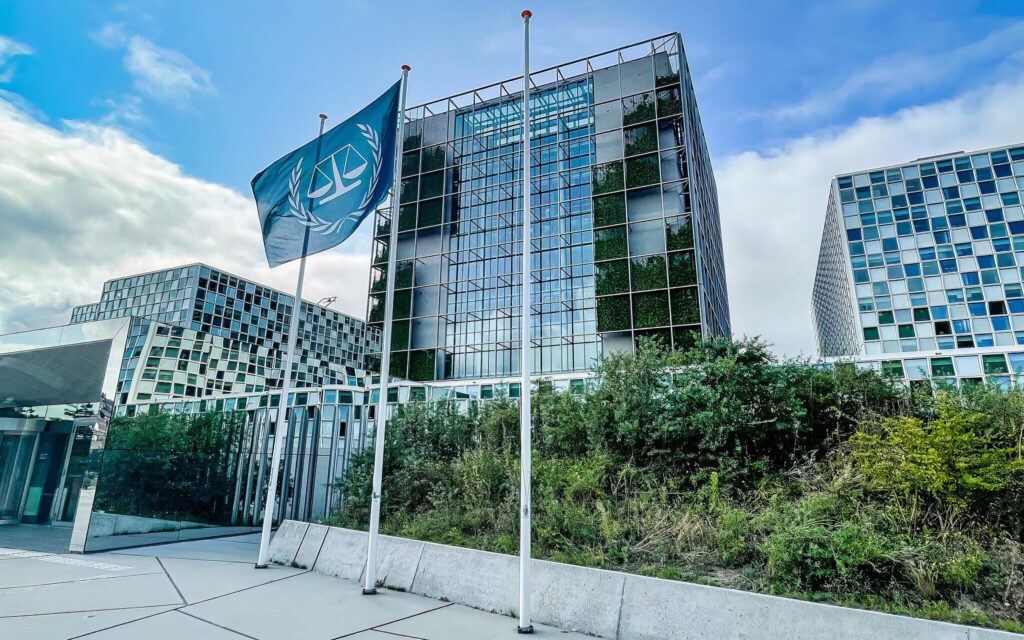
In the face of mounting global attacks on the International Criminal Court (ICC), 58 NGOs are calling on the European Union to take urgent and decisive action to defend the Court and uphold the international rules-based order.
The ICC, established to ensure accountability for the world’s most serious crimes, is increasingly under threat — from economic sanctions, political pressure, cyberattacks, and state non-cooperation. At the heart of the recent controversy is a February 2025 executive order by U.S. President Donald Trump, authorizing sanctions against ICC officials, including Prosecutor Karim Khan, and others supporting the Court’s investigations. International organisations have denounced this move as an affront to victims of international crimes and a dangerous attack on the independence of international justice.
Despite a history of strong support for the ICC, the EU has so far remained silent on the latest U.S. sanctions. We are urging EU member states to publicly condemn the measures, activate the EU Blocking Statute to shield European entities from their impact, and adopt further steps to safeguard the Court’s ability to function effectively.
These developments come at a time when the ICC is proving its relevance — most notably through the recent arrest and transfer of former Philippine President Rodrigo Duterte on charges of crimes against humanity. However, the Court faces significant obstacles elsewhere. Russia has issued retaliatory arrest warrants against ICC officials following the Court’s warrant for Vladimir Putin, while Israel and Russia have enacted or proposed laws criminalizing cooperation with the ICC. The Court is also dealing with the fallout of a 2023 cyberattack and credible allegations of a long-running Israeli espionage campaign.
In Europe, Hungary has announced plans to withdraw from the ICC after hosting Israeli Prime Minister Benjamin Netanyahu — whom the ICC has also indicted. Hungary failed to execute the ICC’s arrest warrant during his visit, in violation of its obligations under the Rome Statute. Several other EU member states, including France, Germany, Italy, Poland, and Romania, have either refused to act on ICC warrants or failed to confirm they would do so. Italy recently returned an ICC fugitive to Libya, in apparent breach of its responsibilities.
The signatories warn that this growing trend of selective enforcement and political hesitation sends a damaging message: that the rule of law applies to some, but not all. Without consistent cooperation and enforcement of ICC decisions, they argue, there can be no meaningful justice for victims.
The EU has long positioned itself as a champion of international justice. It is time to turn words into action — before the credibility and effectiveness of the ICC are irreparably damaged.
The signatories call on EU actors to take decisive action to reaffirm their commitment to and
protection of the international rule-of-law, as follows:
- The EU leadership, including Commission President von der Leyen, High Representative
Kallas, and Council President Costa should urge governments across the EU to respect
the EU’s position on the ICC, including on cooperation, universality of the Rome Statute,
and safeguarding the independence of the Court, and respect their obligations to protect,
uphold, and enforce the Court’s decisions. - The EU, in particular through High Representative Kallas as well as the EU Council
should publicly condemn the US sanctions against the ICC and reaffirm their unwavering
support for the Court and its independence and urge the US to rescind the executive order
authorizing sanctions. - The EU Commission should also swiftly make use of the EU Blocking Statute by adding
to it the US executive order authorizing ICC-related sanctions and develop any additional
measures to protect the Court and counteract the chilling effect of sanctions on those
cooperating with the Court. - EU member states should unequivocally affirm they will enforce all their legal
obligations under the Rome Statute, including executing all ICC arrest warrants, in all
situations before the Court. EU leadership should spare no efforts in reminding member
states of their legal obligations to cooperate with the ICC, and act to prevent and respond
to any instance of noncooperation with the ICC.
“ASF calls on the Belgian government to remain steadfast in its support for the ICC. In a 3th April televised interview, Prime Minister Bart De Wever suggested that, like Hungary, Belgium might not execute the ICC arrest warrant against Prime Minister Benyamin Netanyahu. This would violate Belgium’s international obligations under the Rome Statute and Belgium’s own stated foreign policy. Both in the governmental accord and the policy statement of the Belgian Minister of Foreign Affairs, Belgium commits itself to protecting the international legal order and combating impunity for war crimes, crimes against humanity, and genocide, including through support for the ICC.
As an early ratifier of the Rome Statute, Belgium has been an active supporter of the ICC throughout its history and collaborated positively with the Court, including for the execution of arrest warrants on its territory. At a time of growing political threat levelled against the ICC and the international legal order, Belgium’s ongoing support becomes even more important and should be restated clearly by the government. Combating impunity for international crimes and reaffirming that no one stands above the law, including state leaders, serves the interest of all. Sidelining ICC arrest warrants is not an act of “realpolitik” but an act that threatens international, and Belgium’s, security by removing barriers to states’ use of force against civilians and other states.“
Valérie Arnould, Legal and Policy advisor in Transitional Justice at ASF



